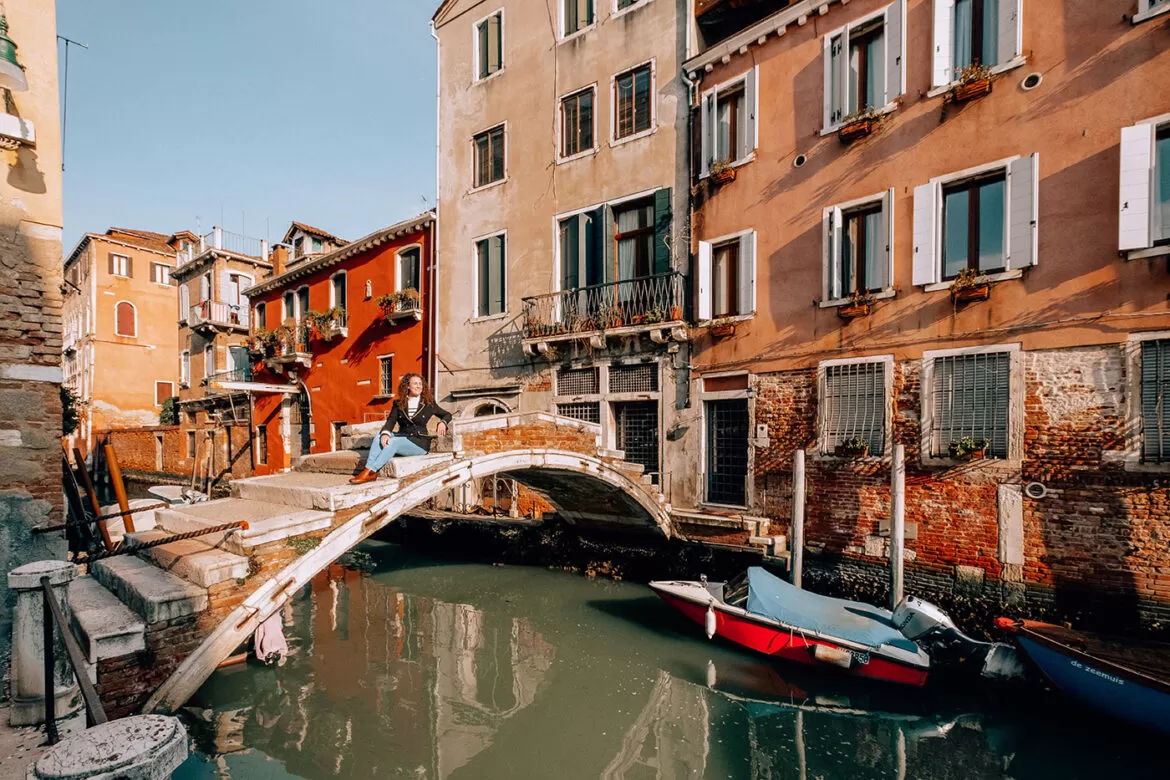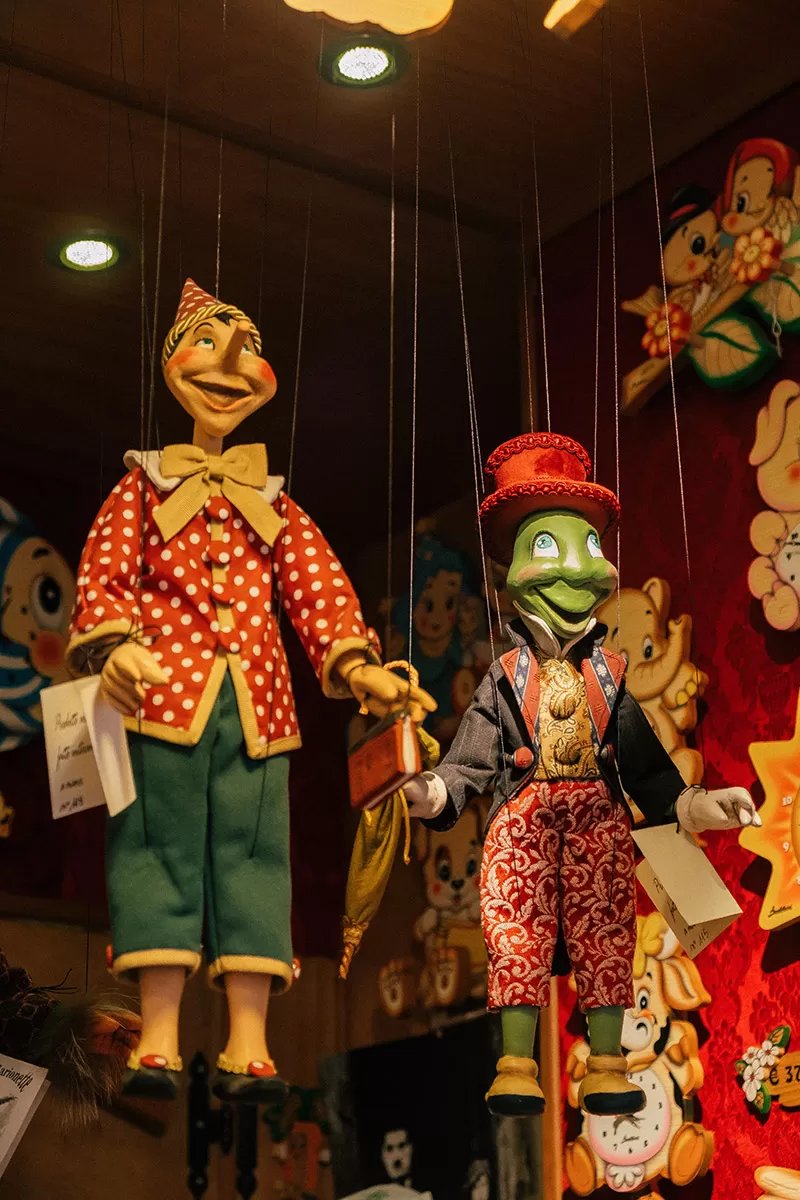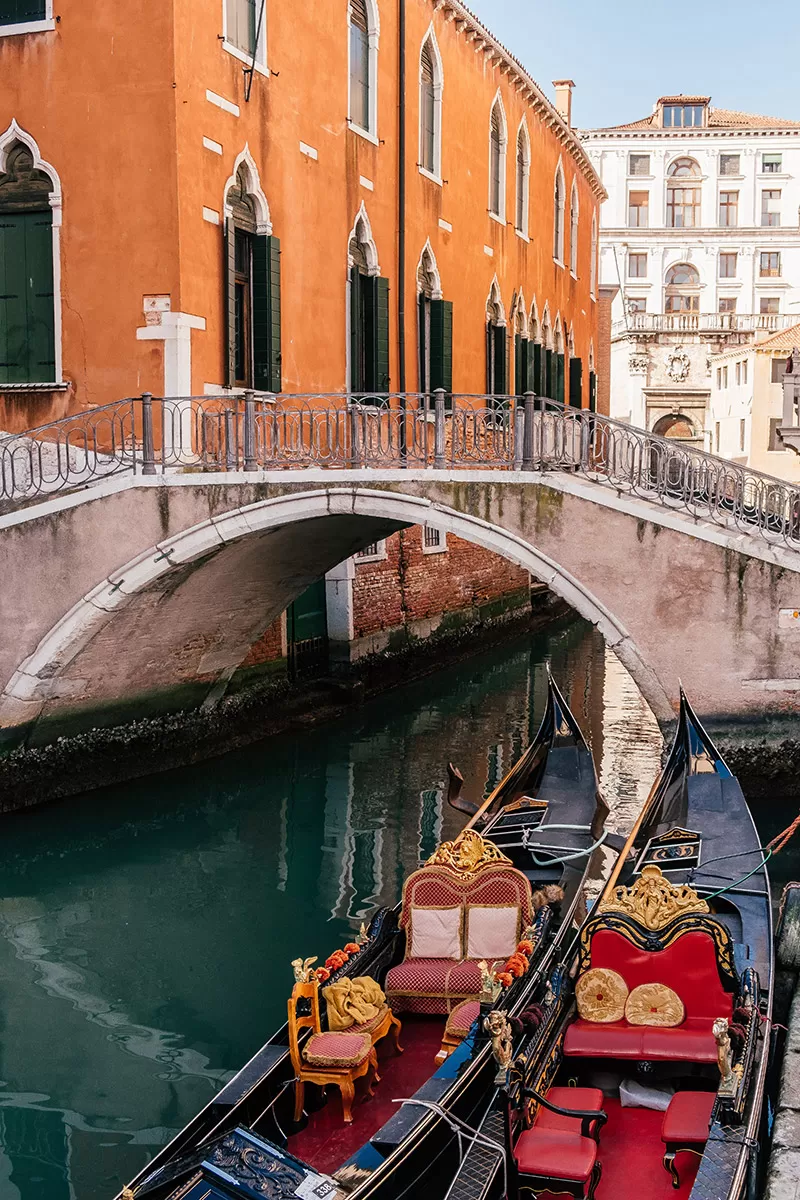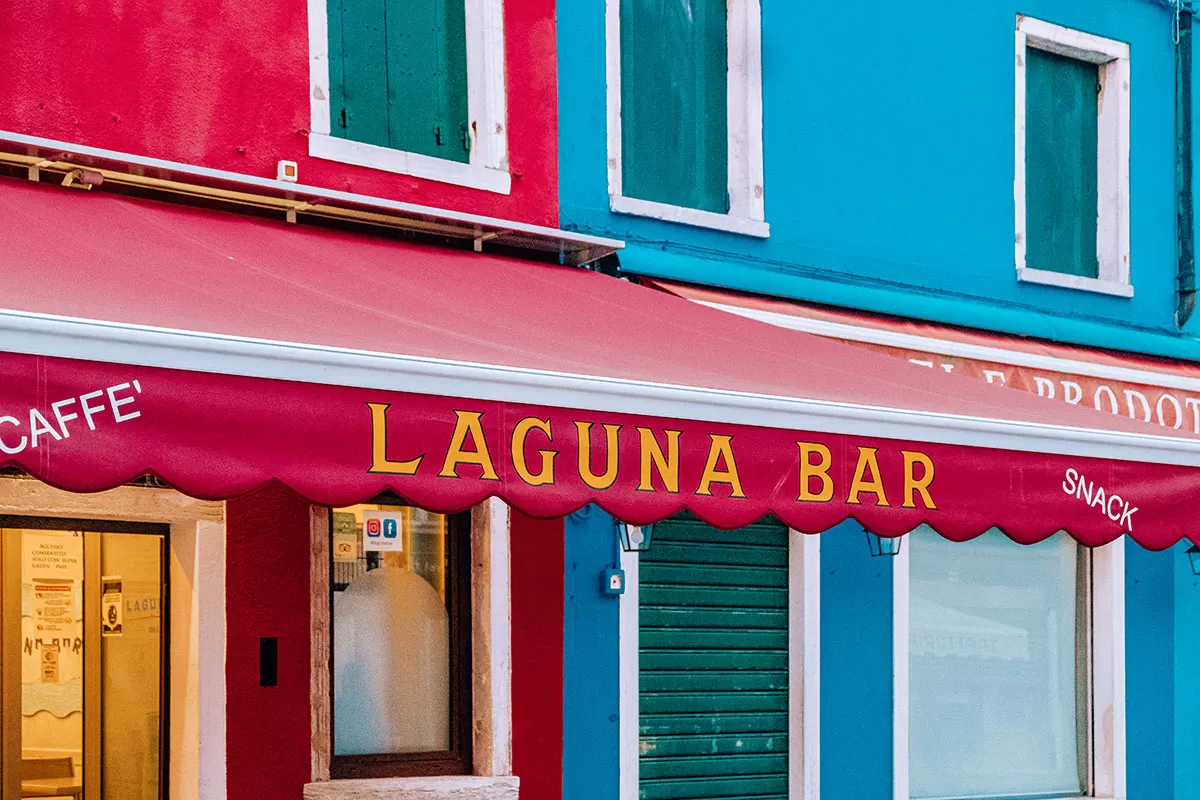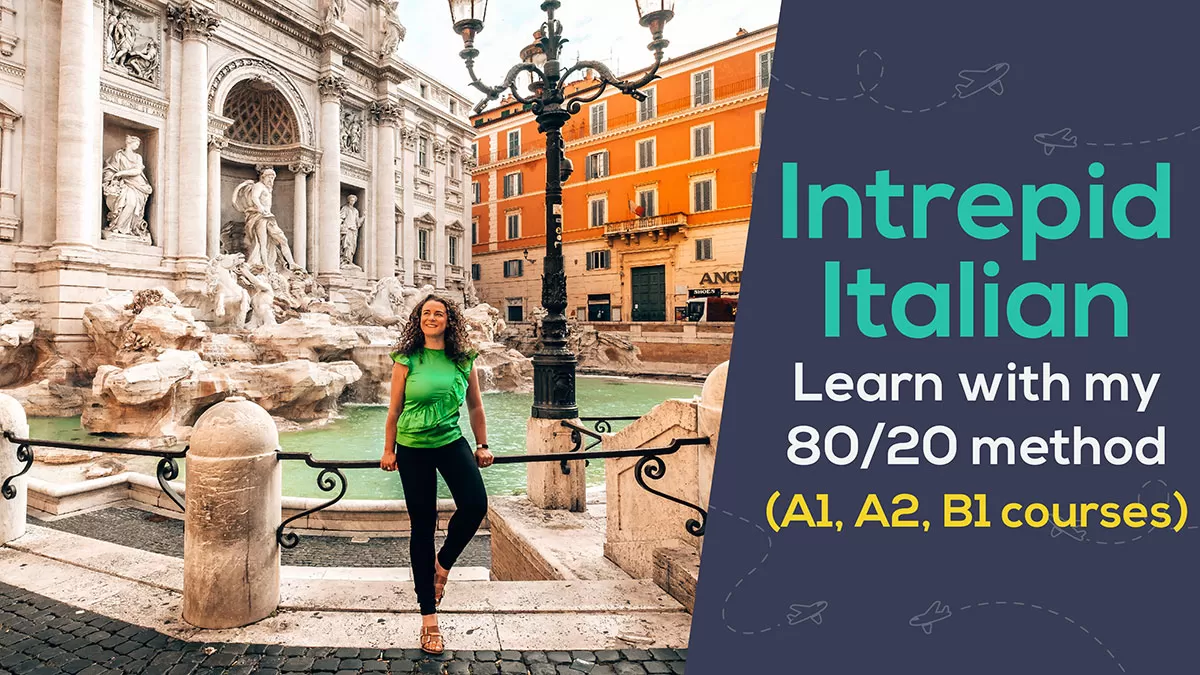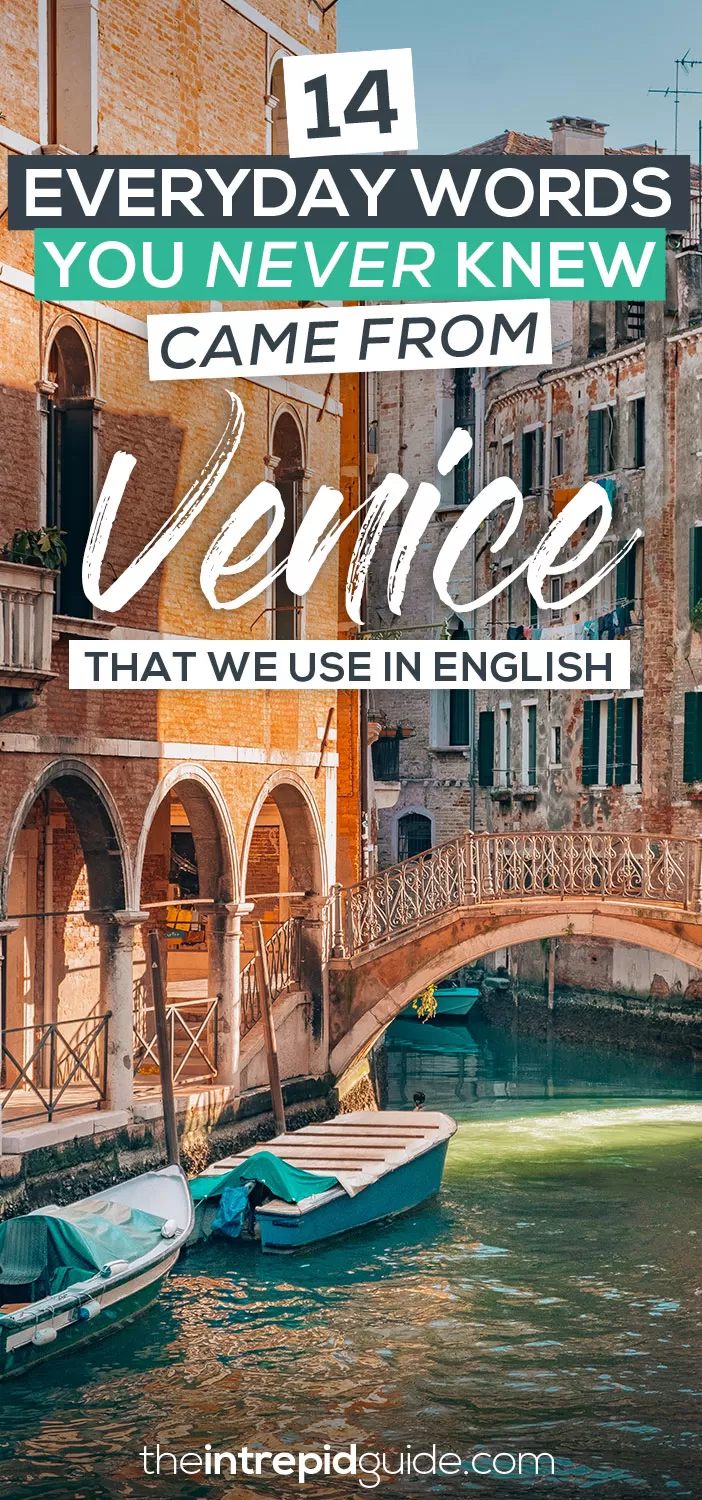Ciao! Whether you speak Italian or not, you’ll most probably recognize this Italian greeting as one of the most common ways to say hello to someone in countless countries around the world. But while the use of ‘ciao’ is widespread and universally known, its origins aren’t! Well, believe it or not, this word, as well as many other everyday words, comes from none other than the most fascinating and idyllic city in the world: Venice!
Perhaps it’s because it has no cars and the only way to move is by boat, gondola or vaporetto (steamboat). Perhaps it’s because of its spectacular Carnival that every year attracts visitors from everywhere. Or perhaps it’s because of the mysterious, dreamlike and melancholic aura that spreads through the city’s calli (the typical narrow streets of Venice). What is certain is that Venice is a very unique city and deserves to be visited at least once in a lifetime.
In this guide, you’ll learn 14 everyday words that come from the Venetian language that are now used in English and many other languages!
But, how did these everyday words ‘travel‘ from Venice and enter English and many other languages? The Venetian language spread widely for commercial reasons, due to the great importance of the Republic of Venice as a maritime superpower in trade. As a matter of fact, Venetian was spoken in all places where traders engaged in business, which means at the very least, in all coastal areas of the Mediterranean. But it is mainly due to the great migration of Venetians in the twentieth century that some terms are now used all over the world. Many of these words describe concepts or things that originated in Venice itself, such as quarantine, marionette, ballot, and spritz… just to name a few.
Curious to see what other Venetian words we still use in English? Andiamo!
The Venetian language and the Republic of Venice
Modern Italian is derived from the Tuscan language, mainly thanks to the spread of the works of Dante and other medieval poets. However, other Italian languages and dialects, including Venetian, continued to flourish due to the fact that Italy was not yet a unified country. The official date of the Unità d’Italia, that is, the Unification of Italy wasn’t achieved by Garibaldi and his troops until 17 March 1861.
Although referred to as a dialetto, an Italian dialect, il veneziano (Venetian) is a Romance language spoken by Venetians in north-eastern Italy. Like all Italian varieties or dialects, it descended from Vulgar Latin.
Venice consists of 120 islands that lie in a large lagoon between mainland Italy and the sea. In the fifth century, the territory of Venice was occupied by pile dwellings and inhabited by people who lived off fishing and salt extraction. Over time, its privileged position not only protected Venice from possible conquests but also guaranteed a fruitful relationship with Byzantium and the development of maritime and commercial traffic.
The political-administrative system of the Republic of Venice originated in the Roman structures inherited from the Byzantines. The head of the Venetian state, the doge, was in fact nothing other than the Roman-Byzantine dux (which means, general). Thanks to armed expeditions and crusades, the foundations were laid for the constitution of a real empire in the East. Venetian power continued until the middle of the eighteenth century, which is when the decline started. After the Treaty of Campoformio in 1797, the Republic of Venice ceased to exist as an independent state after Napoleon ceded it to Austria.
In the days of the Republic of Venice (also called ‘La Serenissima’ meaning ‘The Most Serene’), the Venetian language gained the status of a lingua franca in the Mediterranean Sea. Not only was it used in trade, but also in theatre. It was the main language chosen by several Venetian authors including Carlo Goldoni (1707–1793) and Carlo Gozzi (1720–1806) for their comedies, belonging to the commedia dell’arte, a theatrical form that flourished between the sixteenth and the eighteenth centuries in Italy and in Europe.
Planning a trip to La Serenissima? Don’t miss my guide to the most unique and best things to do in Venice.
14 everyday words you never knew came from Venice
1. Marionette (Marionetta)
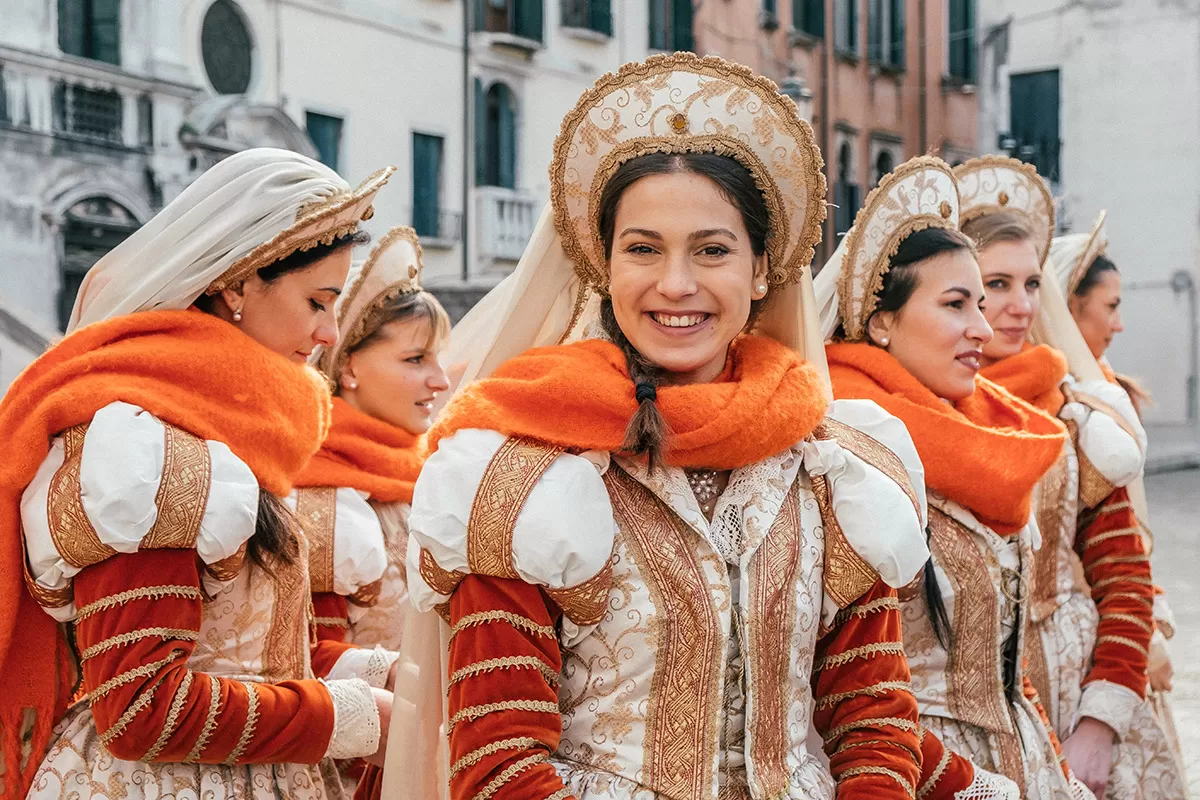
12 Venetian girls are chosen each year as part of the “Festa delle Marie” during Venice Carnival
Speaking of theatre, marionette (in Italian ‘marionetta‘) is a word that comes from the Venetian language. It is believed that the etymology of the name derives from the ‘marie di legno‘ (literally: wooden Marys), a sort of votive offering to the Virgin Mary by the city of Venice, for having miraculously snatched twelve beautiful Venetian girls from the hands of Barbary pirates in 944 AC.
But let’s take a step back. Initially, in a commemorative feast that was held every year to celebrate this event, twelve girls decadently dressed in gold and precious stones were led in procession through the calli of Venice. Soon enough, however, the choice of Marie became difficult (all Venetian girls wanted to enjoy such a privilege!) and the patricians’ desire to show off turned into a race to the top that was no longer financially sustainable.
That is why, later on, it was decided to replace the girls with carved wooden statues, called ‘Marie‘, or better, given their natural size, ‘Marione’ (you should know that the suffix –one in Italian is an augmentative, meaning, it is hooked onto the end of a word to denote largeness).
Afterwards, the statues were also reproduced in a smaller size by toymakers to amuse children and to be sold to the public. The reproductions of these figures were called ‘marionette‘, a word which today indicates wooden figures or puppets manipulated from above by strings attached to their jointed limbs.
2. Pants (Pantalone)
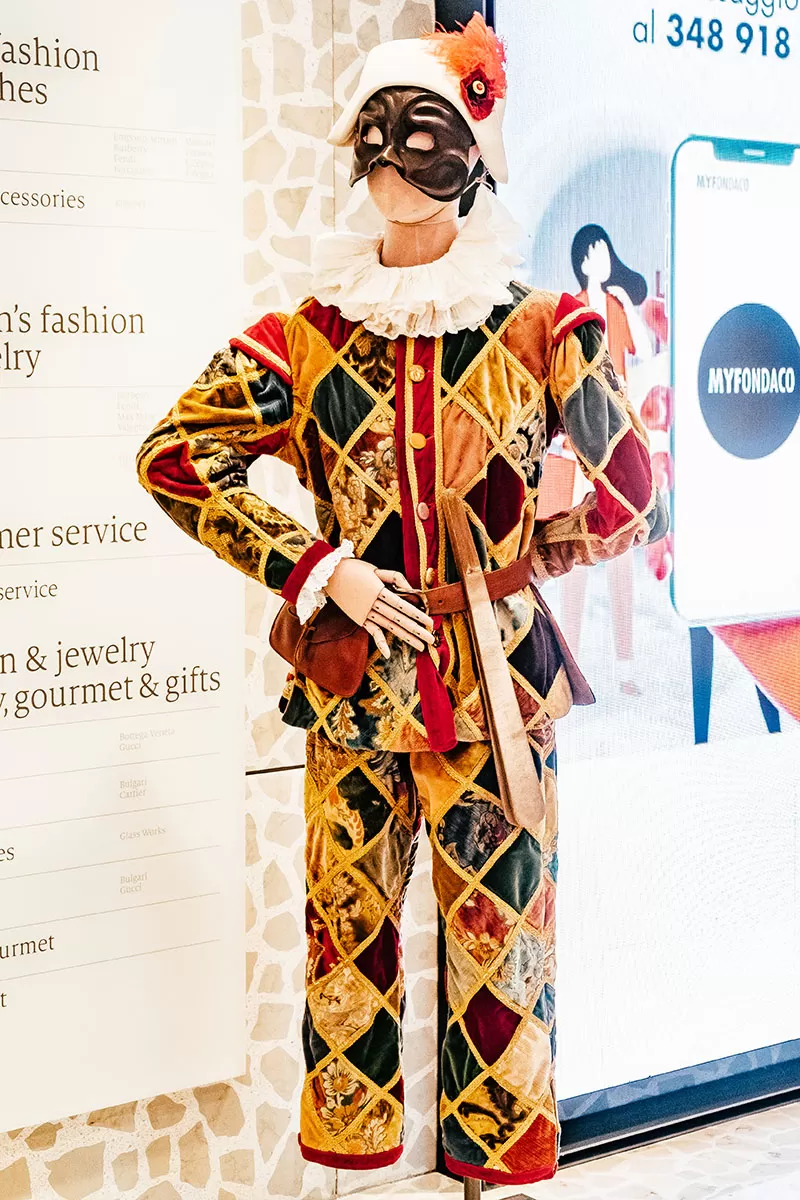
The classical appearance of the Harlequin character in the commedia dell’arte of the 1670s
To stay on the subject of theatre, here’s another word that you probably had no idea came from Venice: pants (being the long trousers, as referred to in American English). If you are a fan of theatre and are familiar with the commedia dell’arte, then the origin of this term is quite logical.
As a matter of fact, one of the characters of this theatrical genre is called Pantalone, known as the servants Harlequin and Columbine, a miserly and greedy merchant, whose disguise is nowadays used as a typical Venetian Carnival costume. This character is represented wearing tight ankle-length trousers and that’s where the name comes from. It seems that this piece of clothing was so popular among the Venetian people that even in France the citizens of the Serenissima were called ‘pantalons‘.
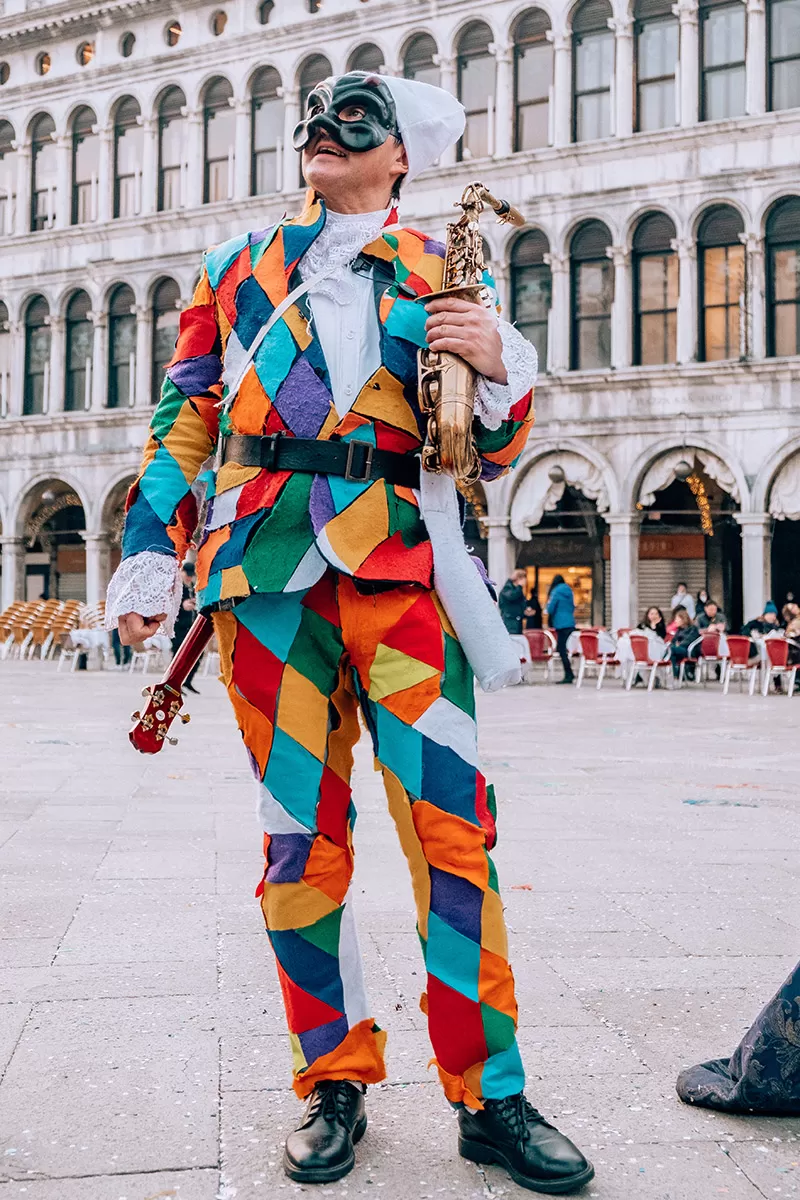
Pantalone costume during Venice Carnival
3. Ciao
As we learned earlier, ‘ciao’ is a widespread Italian greeting that originated in Venice. The word is a contraction of s’ciao and its original meaning was ‘I am your slave’ or ‘at your service‘. It was a form of reverent greeting and devotion used with important people or perhaps to court a lady. According to scholars, s’ciao derives from the Latin ‘sclavus‘, which translates to slave. Surprisingly, this form of greeting only became part of the Italian language at the beginning of the 20th century, yet it quickly spread and is used (albeit in different writings) in many languages today!
4. Ghetto
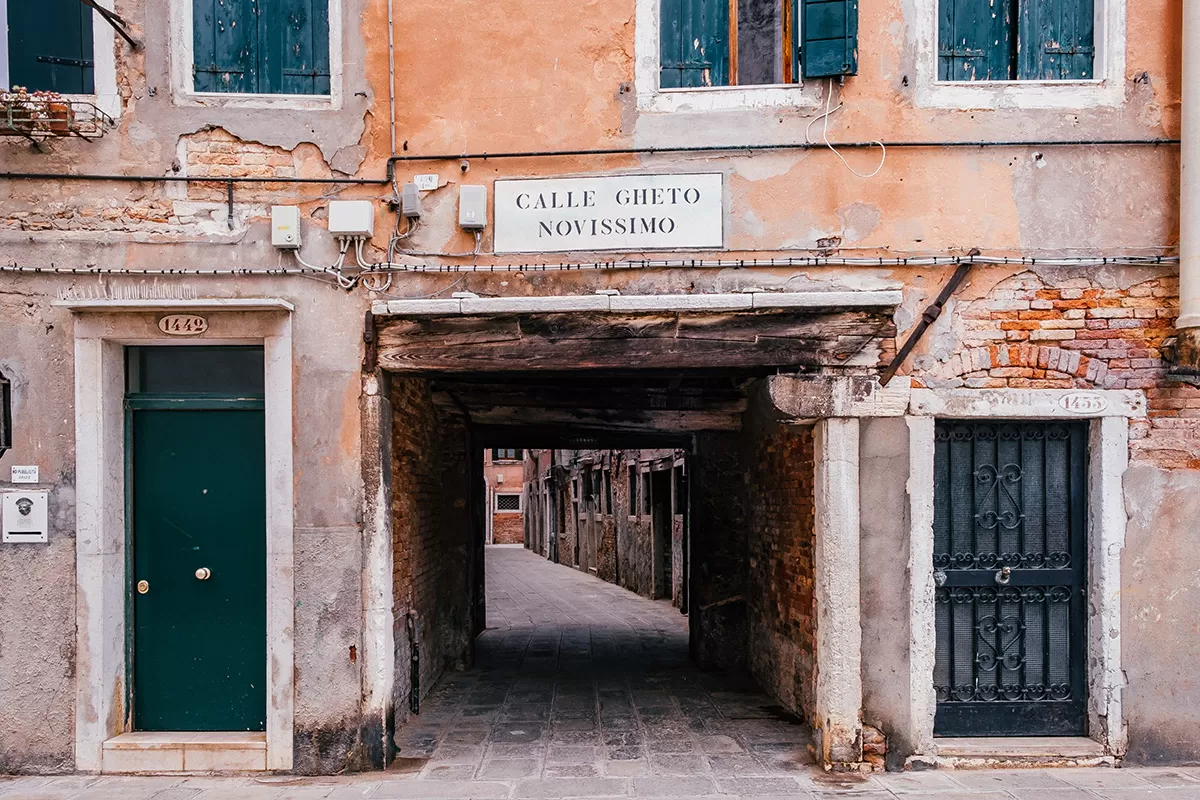
At this time, there were copper foundries in the area called ‘getto‘ (pronounced jeht-toh), standing for the casting (in Italian ‘gettata‘) of molten metal. The first Jews in this area to observe the law enforced by the Serenissima were the Ashkenazim from mid-eastern Europe. Due to the combination of their guttural pronunciation and the Venetian term “geto”, formed the word “ghetto”.
During the 16th century, the term ghetto spread throughout Europe. Nowadays, the term is used all over the world to indicate a place where ethnic minorities or marginalised social groups live. In modern Italian, however, the word is a non-offensive, non-racist term that is used mostly to refer to the aforementioned historical facts.
5. Gondola
It’s not hard to guess where ‘gondola’ originates since it indicates a kind of boat that can only be found in Venice’s canals. The term gondola probably came from the verb dondolare, meaning ‘to rock’, referring to the movement of this boat on the water. Another explanation is that gondola is the Venetian version of the medieval Greek κονδοῦρα (kondura), which, in fact, meant ‘boat‘.
6. Calle
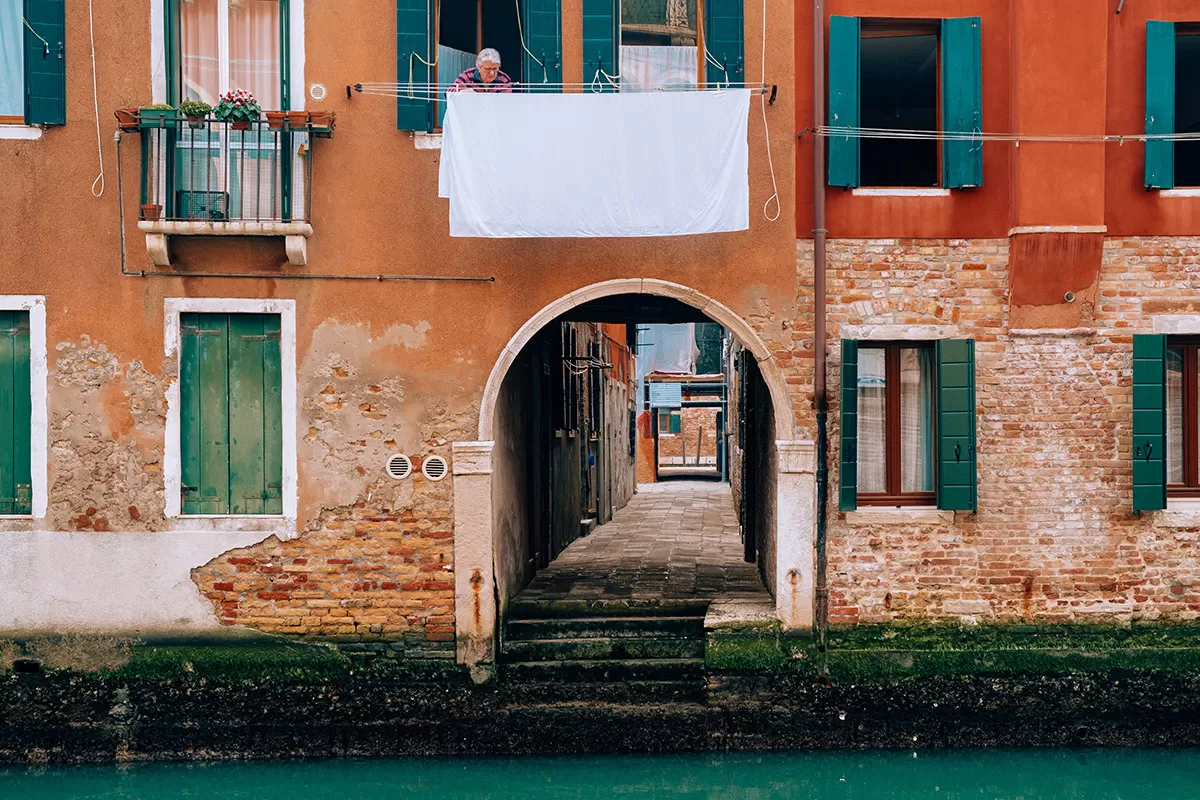
7. Lagoon (Laguna)
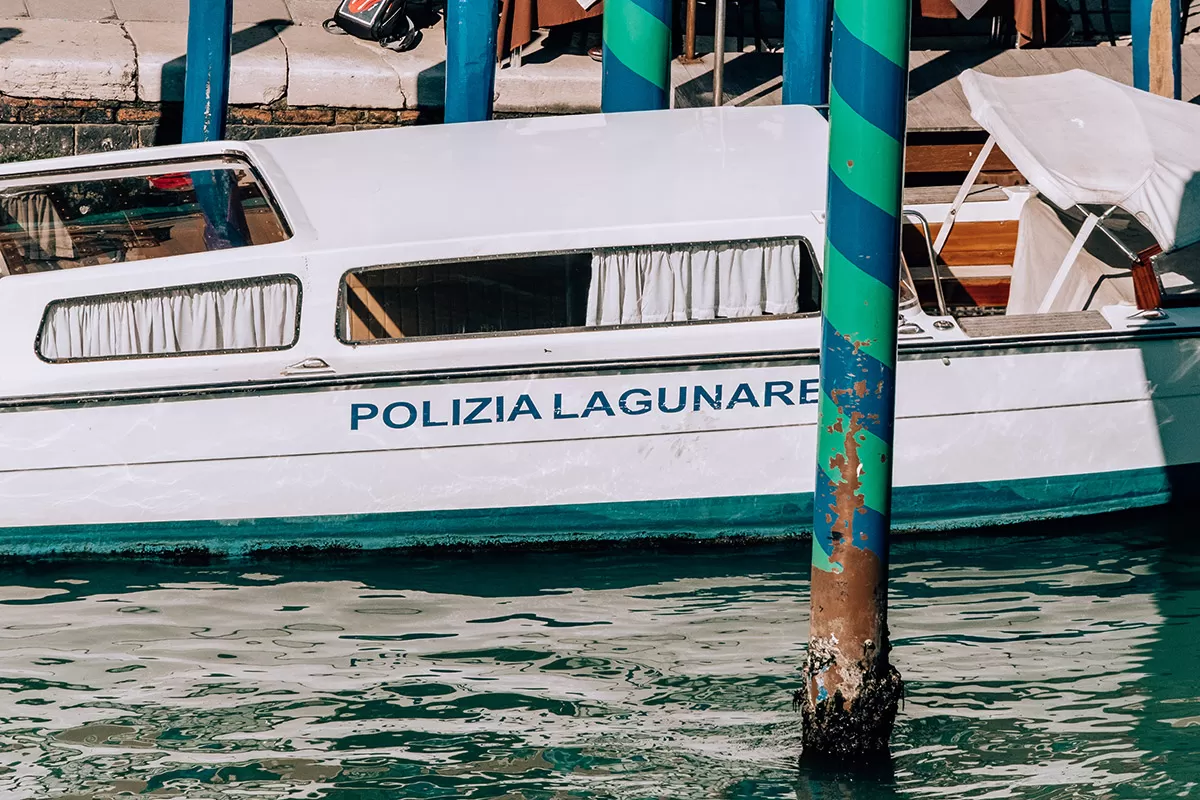
Polizia Lagunare (Lagoon Police)
The word ‘laguna’ comes from the Latin lacuna/lacus, meaning ‘pond, hole, empty’. ‘Laguna‘ was originally used in reference to Venice and afterwards, it spread to refer to swampy, shallow, brackish water beside a sea but separated from by pieces of land. Did you know that the Venice Lagoon is the largest lagoon in the Mediterranean Sea? Its surface extends for about 550 km². In 1987, the entire territory was included in the UNESCO World Heritage List.
8. Lido
Similarly to ‘laguna’, the word lido comes from Latin litus, meaning ‘shore’ or ‘bank’. Nowadays, the word has gained the reputation of being a luxurious and chic holiday destination in a seaside resort. Originally, it referred to the coastal strips that separate the Venetian lagoon from the open sea. Today, Venice’s Lido is known as one of the most popular seaside resorts in Italy. It is half an hour from the city and is about 12 km long. Its transformation began at the end of the nineteenth century when villas and hotels were built.
9. Quarantine (Quarantena)
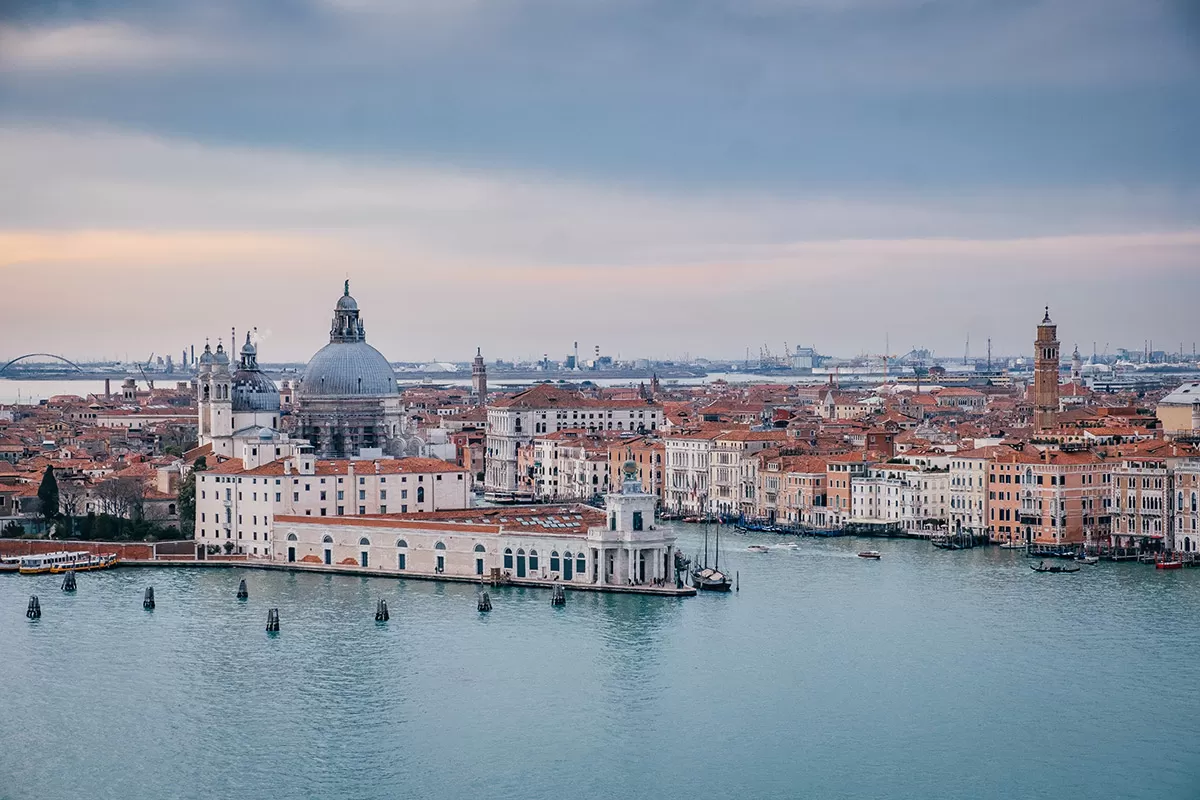
Punta delle Dogana (Customs Point) was used for docking and customs since the beginning of the 15th century.
Quarantine (English), quarantena (Italian), Quarantäne (German), quarantaine (French)… Never has a word seemed more relevant! This word actually has ancient origins: between 1347 and 1359, the Black Death killed approximately 30% of the population of Europe and Asia.
In order to prevent the spread of contagion, any ship arriving at the Venetian port suspected of carrying contagious people or animals were forced to undergo an isolation period of forty days. The isolation was referred to as ‘quarantena‘ (from Italian ‘quaranta‘, meaning ‘forty’). The forty-day period is due to the belief that after this time a plague victim was no longer contagious. In reality, the disease was spread by rat fleas, which were still very much alive even after quarantine.
The Venetian government was the first one to adopt this method and to introduce restrictive measures to try to contain infections. In 1468, the Lazzaretto Nuovo was established in the lagoon, where anyone suspected of being ill was isolated for forty days. If infected, the sick were eventually taken to the Lazzaretto Vecchio, which was located on the old island of Santa Maria di Nazareth, from which the word lazzaretto (a quarantine station) itself derives.
10. Gazzette (Gazzetta)
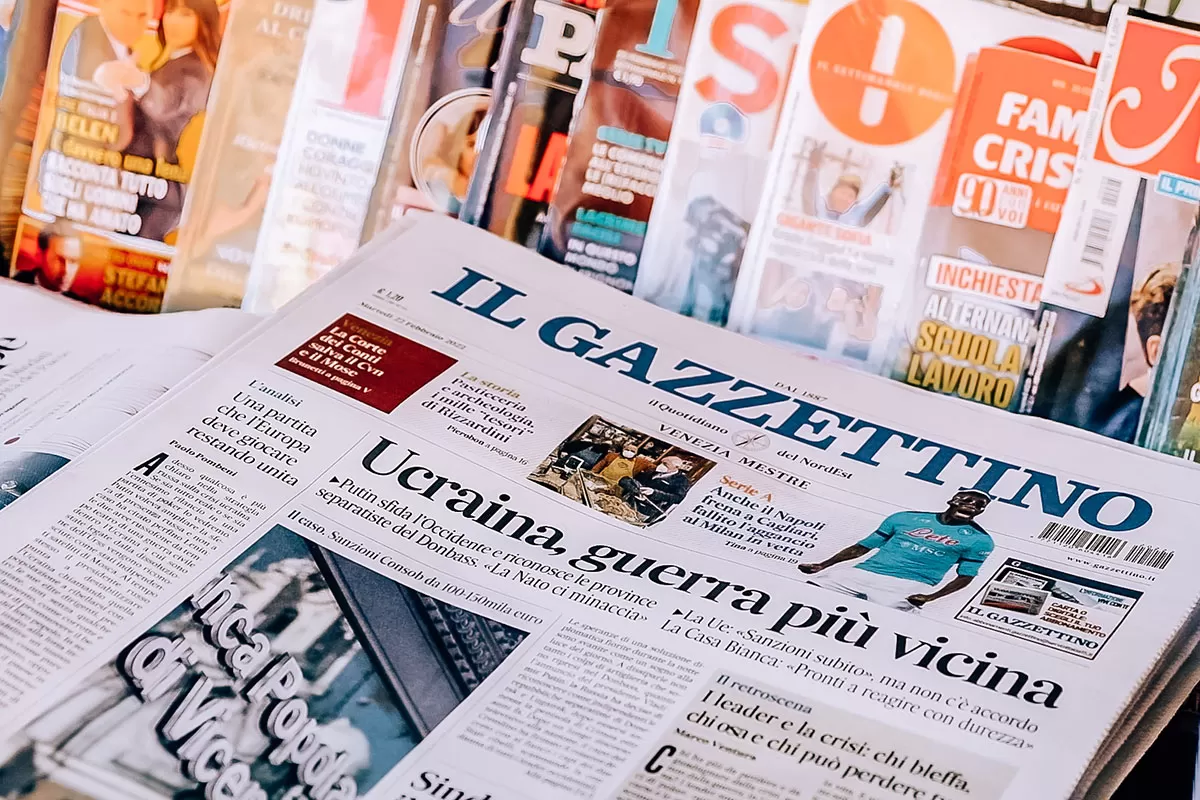
Il Gazzettino (Little gazette) is an Italian daily local newspaper, based in Mestre, Italy.
If you read print newspapers, you should know that you are perpetuating a Venetian tradition that is more than 500 years old! As a matter of fact, during the sixteenth century, the Serenissima, decided to distribute a notice sheet with official news on the progress of the crisis with the Turkish empire. The newspaper, published with just a few pages, was sold for the price of due soldi (two coins). And do you know what that Venetian coins were called? Gaxeta. The name entered the Italian language with the word gazzetta (which is now a popular sports newspaper) and spread to other languages too, becoming synonymous with a periodical of news for the inhabitants of a given area.
11. Ballot
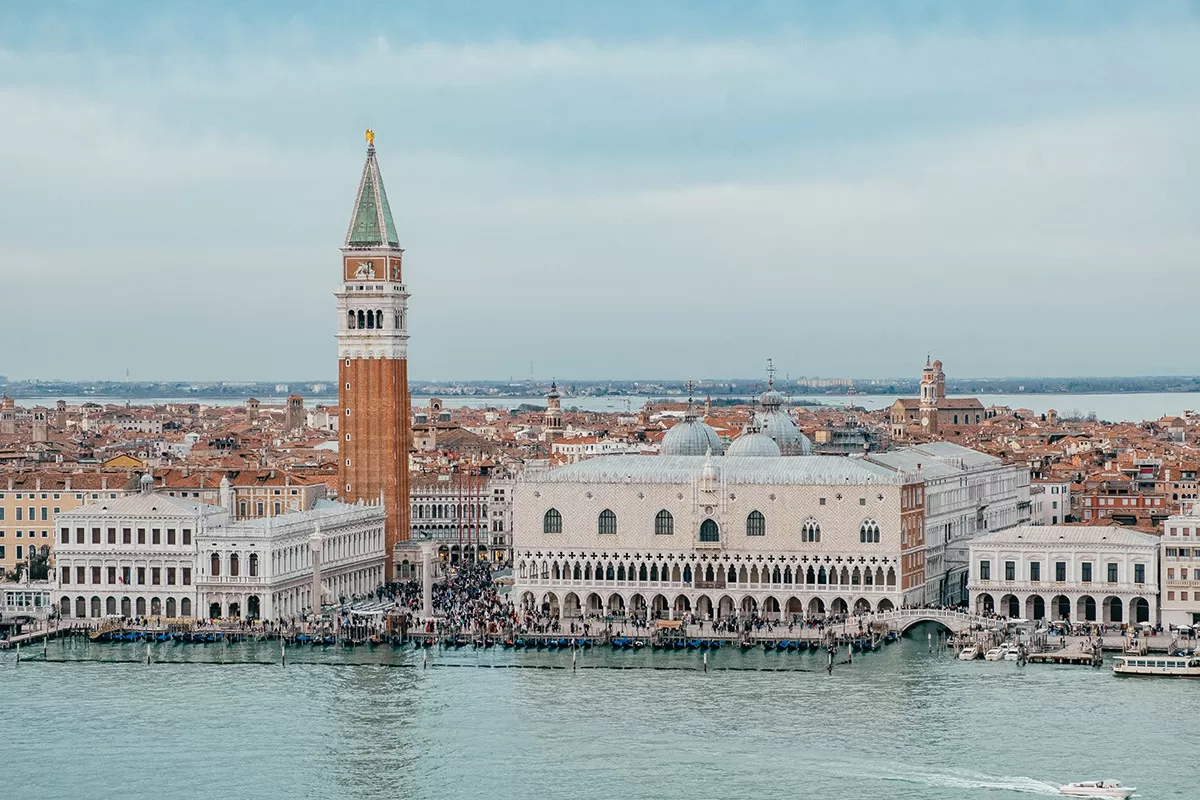
This term then flowed from Venice into the Italian language (‘ballottaggio‘) and beyond. It was soon taken up by the United States (‘ballot‘) and France (‘ballottage‘). Why did it spread? When these new democracies had to choose an electoral system, they turned to the only example of democracy that existed in 1700: the Venetian one.
12. Casanova
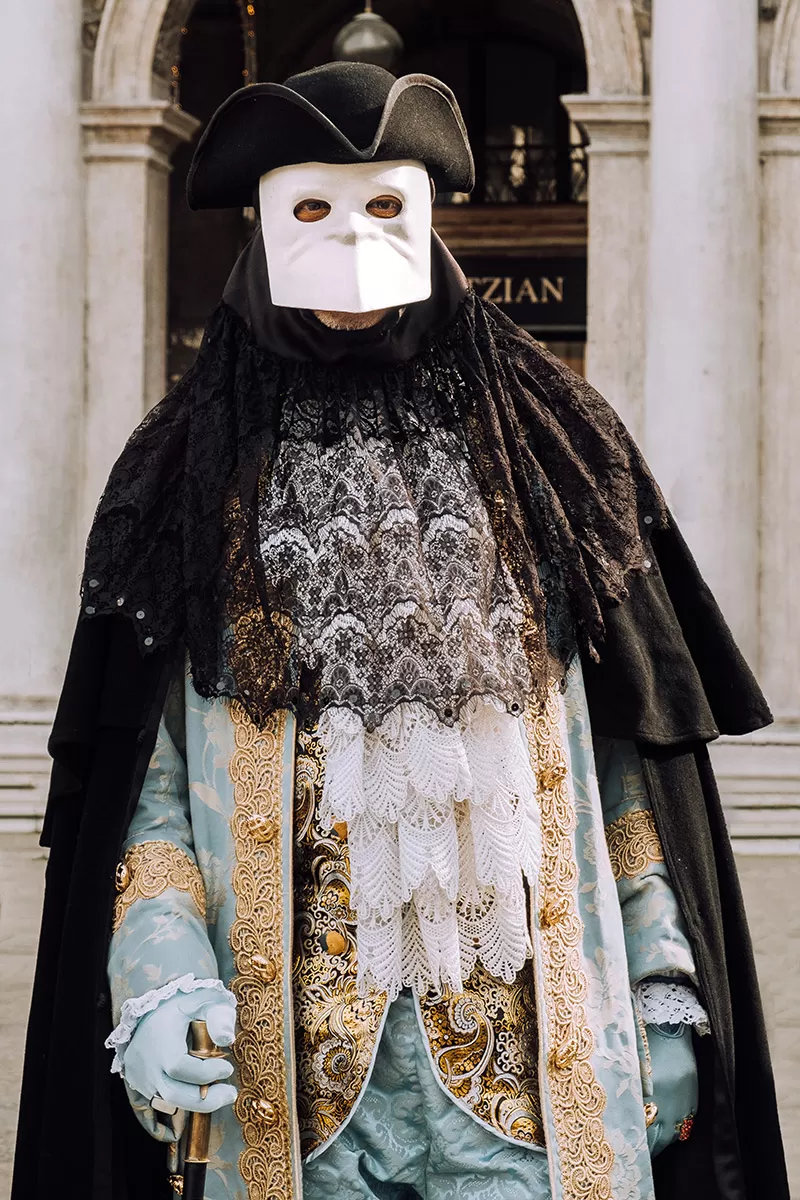
13. Arsenal (Arsenale)
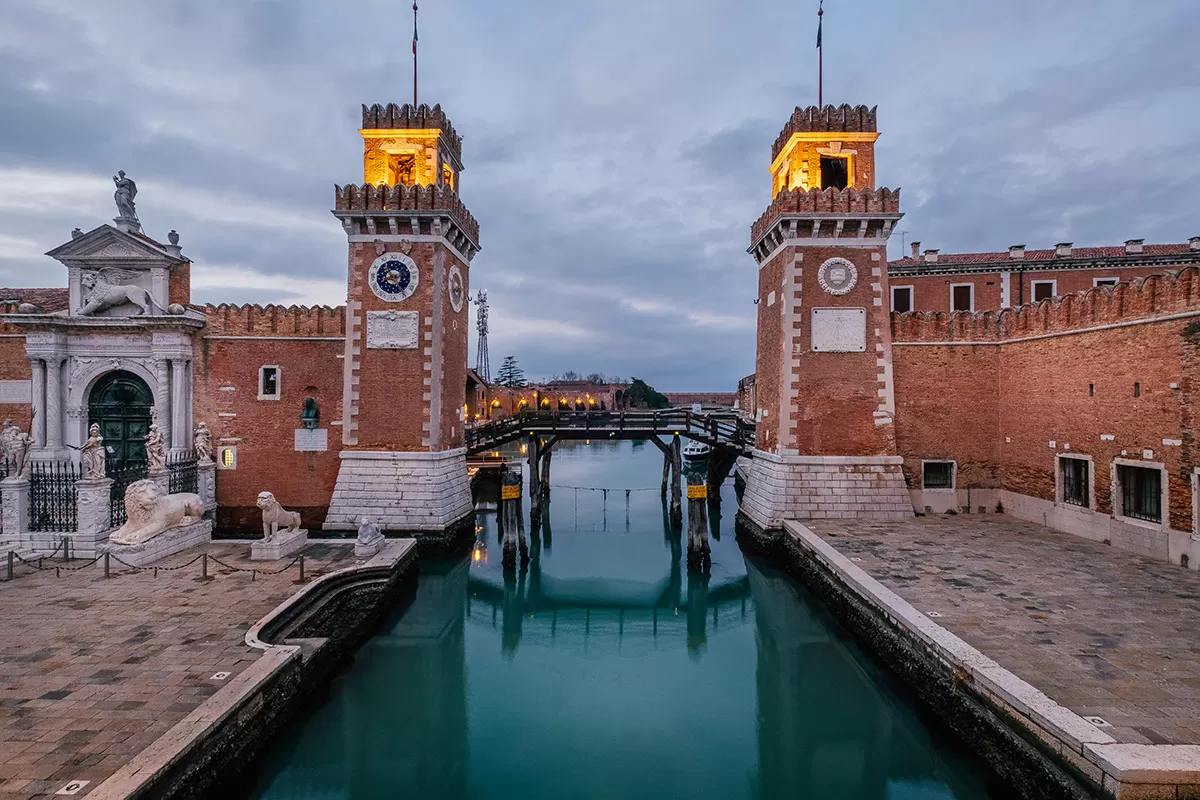
Established in 1104, the Arsenale in Venice was the greatest medieval shipyard in Europe.
The term arsenal (in Italian ‘arsenale‘) refers to an establishment or factory used for the construction, repair, storage and supply of arms and ammunition or a place where military ships are built and maintained. The term developed from Arabic دار الصناعة (dār al-ṣināʻah), meaning ‘house of industry’, or ‘factory’ from which the words ‘darsena‘ and, therefore, ‘arsenale‘ are derived from the Venetian language.
Later on, this Venetian word spread into 14 other languages, including English. It’s not surprising that the Serenissima adopted this word, given its important naval tradition and legacy as a Maritime Republic and more generally, the insular position of Venice. In the 16th century, the Venetian Arsenal reached the peak of its production.
14. Spritz
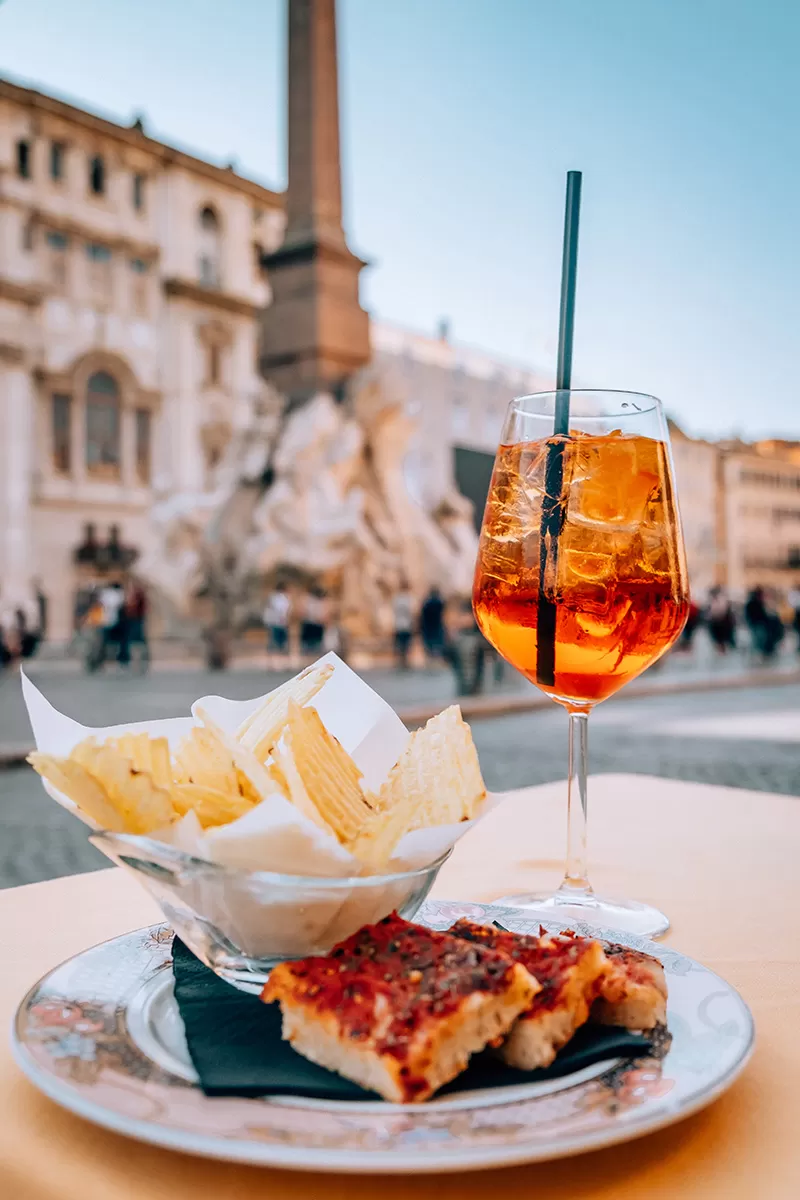
Later on, during Austrian domination, the ombra was diluted with soda. The current name for Spritz comes from the German verb ‘sprizen‘, which means ‘to spray’. Over the years, several new variants were added, including, Aperol, Campari, Select, and Cynar, creating the modern drink we know today. Still today in Venice there are many different ways in which Spritz is made, according to personal taste and inspiration.
Conclusion
Even though the Tuscan language was ultimately chosen as the basis for standard Italian, Venetian remains one of the most widely spoken languages in Italy, thanks to the strong sense of regional identity that characterises Venice and the surrounding area. Thanks to the economic and cultural prestige of Venice, for centuries these colourful words have found their way into other modern languages and still carry a powerful and impactful meaning. Who knew you knew so many Venetian words?! Crazy, right?
 Enjoyed this lesson? Are you a beginner or an intermediate Italian learner? Got a trip coming up or want to communicate with your Italian partner or relatives in Italian? Learn Italian with my unique 80/20 method
Enjoyed this lesson? Are you a beginner or an intermediate Italian learner? Got a trip coming up or want to communicate with your Italian partner or relatives in Italian? Learn Italian with my unique 80/20 method
Registrations are now open to join Intrepid Italian, my new series of online video courses that use my unique 80/20 method. You’ll go from a shy, confused beginner to a proficient and confident intermediate speaker, with me as your trusty guide.
You’ll finally be able to connect with your Italian partner, speak to your relatives and enjoy authentic travel experiences in Italy that you’ve always dreamed of, and so much more.
As a native English speaker who learned Italian as an adult, I know what it’s like to feel hopeless and lack the confidence to speak. I know what it’s like to start from scratch and to even go back to absolute basics and learn what a verb is!
Intrepid Italian was created with YOU in mind. I use my working knowledge of the English language to help you get into the ‘Italian mindset’ so you can avoid the common pitfalls and errors English speakers make – because I made them once too! I break everything down in such a way that it ‘clicks’ and just makes sense.
No matter what your level is, there is an Intrepid Italian course for you, including:
- 🇮🇹 Intrepid Italian for Beginners (A1)
- 🇮🇹 Intrepid Italian for Advanced Beginners (A2)
- 🇮🇹 Intrepid Italian for Intermediates (B1)
You can join 1, 2, or all 3 courses, it’s entirely up to you. The best part is that you have lifetime access so you learn anytime, anywhere and on any device.
As your guide, I walk you through each lesson, step-by-step, using my unique 80/20 method. My approach is different from traditional methods because I teach you the most important 20% of the language right from the beginning so you can start to speak straight away.
Each course includes video lessons, audio exercises, downloadable worksheets, bonus guides, a private support community, and lifetime access all designed to streamline your learning while having fun.
It even comes with my famous Celebrate with a Spritz Guarantee. After 30 days of using Intrepid Italian, if you don’t want to celebrate your newfound Italian skills with an Aperol Spritz, you don’t have to pay a penny! Cheers! 🥂
Join Intrepid Italian here and start learning today!
Ci vediamo lì! (See you there!)
Learning Italian? Check out these Italian language guides
- Italian for Beginners | How to Learn Italian in 3 Simple Steps
- Italian Cognates & Loanwords: 17 Rules to Italianizing English Words You Already Know
- Ultimate Guide to the Italian Alphabet: Letters, Pronunciation, and Stress
- How to say ‘Merry Christmas’ in Italian [Plus New Year Vocabulary and Quiz]
- 34 Words That Don’t Exist in Italian (English Loanwords in Italian)
- Italian Culture: 19 Weird Things Italians Do That No One Warns You About
- 17 Weird Italian Superstitions Italians ACTUALLY Live By
- 17 Must-Know Italian Hand Gestures: The Ultimate Guide
- Top 24 Most Important Verbs in Italian (Plus PDF Cheat-Sheet & Quiz)
- 10 Ways Natives REALLY Say ‘You’re Welcome’ in Italian
- How to say ‘Please’ in Italian in 9 Ways Like a Native
- 41 Italian Greetings: How to Say ‘Hello’ in Italian Like a Local
- 125 Most Common Italian Phrases for Travel You’ll Ever Need [PLUS Printable]
- 8 DEADLY mistakes in Italian (& How to Avoid Them)
- How to Conjugate Italian Verbs in 3 Simple Steps [Italian for Beginners]
- Is Italian Hard to Learn? 7 Common Mistakes & How to Avoid Them
- Master Days of the Week in Italian (7 Simple Memory Hacks)
- Italian Numbers: How to Count in Italian From 0 to 1 Billion (Plus PDF Download)
- How to Order Food & Drinks in Italian [Italian for Beginners]
- 15 Italian Words You Should NEVER Mispronounce [& How Not To]
- 11 Effective Hacks That’ll Help You Learn Italian So Much Faster
- Top 14 Italian Words You Should NEVER Say [& What to Use Instead]
- 20 Hilarious Everyday Italian Expressions You Should Use
- Romanesco: 25 Cool Roman Dialect Words You Should Use in Rome
- 10 Reasons Why Learning Italian Will Change Your Life
- 10 Italian Expressions Italians Love Saying
- 10 Italian Phrases That Will Instantly Make You Sound more Italian
- Funny Italian Sayings: 26 Food-Related Insults You Won’t Forget
- 15 Romantic Italian Films That’ll Make You Love Italy Even More
- How to Master Common Italian Phrases for Travel (Like a Local!)
Like it? Pin it for later!
Over to you!
Did you find this guide helpful? Got a question? Let me know using the comments section below or join me on social media @intrepidguide or @intrepiditalian to start a conversation.
Thanks for reading and I hope you enjoyed this post.
Like what you see? Subscribe using the form below to have all of my posts delivered directly to your email.

